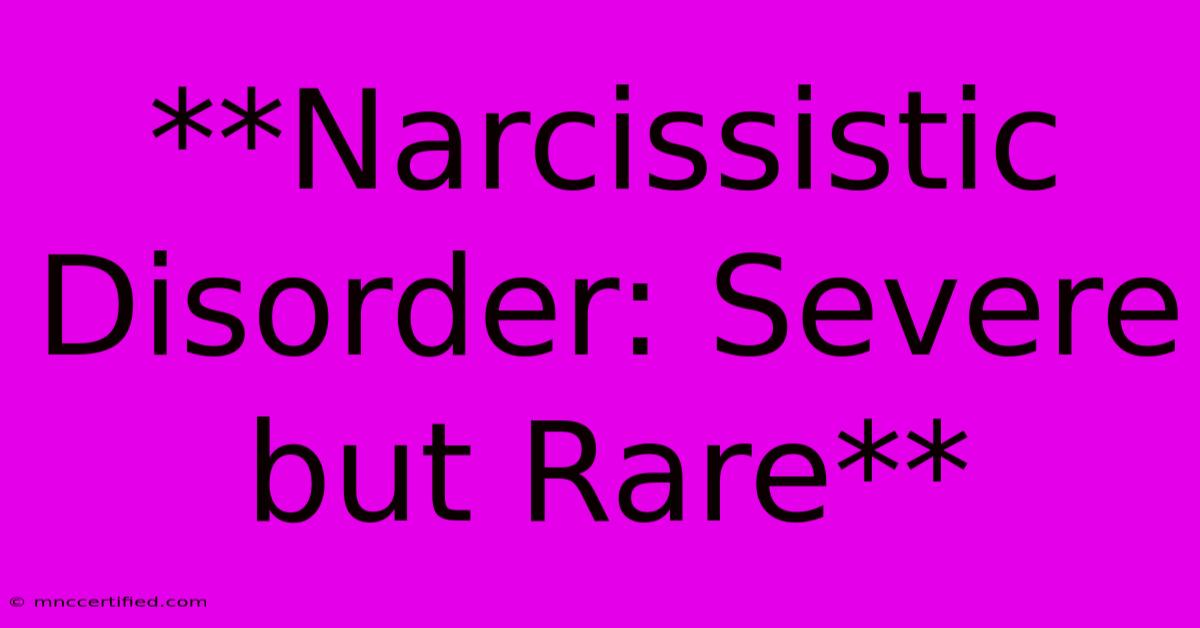**Narcissistic Disorder: Severe But Rare**

Table of Contents
Narcissistic Disorder: Severe but Rare
Narcissistic personality disorder (NPD) is a mental health condition characterized by an inflated sense of self-importance, an excessive need for admiration, and a lack of empathy for others. While it's often depicted in popular culture, it's important to remember that NPD is a serious disorder that can significantly impact a person's life and relationships. However, it's also important to note that NPD is relatively rare, affecting only about 1% of the population.
Symptoms of Narcissistic Disorder
People with NPD often exhibit a range of symptoms, including:
- Grandiose sense of self-importance: They believe they are superior to others and deserve special treatment.
- Preoccupation with fantasies of success, power, beauty, or ideal love.
- Need for constant admiration: They crave praise and attention from others.
- Exploitation of others: They take advantage of others to achieve their own goals.
- Lack of empathy: They are unable to understand or share the feelings of others.
- Envy of others: They often feel jealous of those they perceive as successful or talented.
- Arrogant and haughty behaviors: They often act superior and dismissive of others.
Causes of Narcissistic Disorder
The exact causes of NPD are not fully understood, but it is believed to be a complex interplay of genetic predisposition, early childhood experiences, and environmental factors.
- Genetic predisposition: Studies suggest that there may be a genetic component to NPD.
- Early childhood experiences: Experiencing neglect, abuse, or inconsistent parenting can contribute to the development of NPD.
- Environmental factors: Cultural pressures that emphasize success, wealth, and status can also play a role.
Diagnosing and Treating Narcissistic Disorder
Diagnosing NPD can be challenging, as it often involves a complex interplay of behaviors and personality traits. It is crucial to seek a diagnosis from a qualified mental health professional.
Treatment for NPD typically involves psychotherapy, which aims to help individuals with NPD:
- Develop empathy and compassion for others.
- Identify and challenge their distorted beliefs about themselves and others.
- Improve their ability to regulate their emotions.
- Develop healthier interpersonal skills.
Understanding and Managing Relationships with Narcissists
Living with or being in a relationship with a narcissist can be incredibly difficult. If you find yourself in such a situation, remember:
- Set healthy boundaries.
- Protect yourself from emotional abuse.
- Focus on your own well-being.
- Seek support from a therapist or support group.
It's important to remember that while NPD is a complex disorder, it is treatable. With the right support and resources, individuals with NPD can improve their lives and relationships.
Remember, the information provided in this article is for general knowledge and informational purposes only, and does not constitute medical advice. If you have concerns about your own mental health or that of someone you know, please reach out to a qualified healthcare professional.

Thank you for visiting our website wich cover about **Narcissistic Disorder: Severe But Rare**. We hope the information provided has been useful to you. Feel free to contact us if you have any questions or need further assistance. See you next time and dont miss to bookmark.
Featured Posts
-
Injury Blow For Barcelona Yamal Lewandowski Out
Nov 12, 2024
-
Do Bearded Dragons Bond With Humans
Nov 12, 2024
-
9 Bond Street 5th Floor Brooklyn Ny
Nov 12, 2024
-
Buyers Agent For Investment Property
Nov 12, 2024
-
Mtv Europe Awards Gossip Highlights
Nov 12, 2024